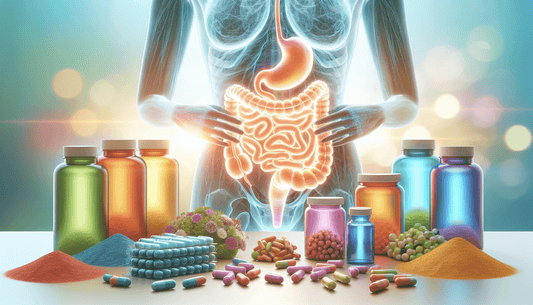Unlock Your Gut's Potential: How Digestive Enzymes Boost Health

- Unlock Your Gut's Potential: How Digestive Enzymes Boost Health
- Understanding Digestive Enzymes: Nature's Digestive Helpers
- The Three Main Categories of Digestive Enzymes
- Signs Your Body Might Need Digestive Enzyme Support
- Common Symptoms of Enzyme Deficiency
- The Science Behind Digestive Enzymes and Gut Health
- How Enzymes Affect Nutrient Absorption
- Natural Sources of Digestive Enzymes
- Enzyme-Rich Foods to Include in Your Diet
- Choosing the Right Digestive Enzyme Supplement
- Key Factors in Selecting Quality Supplements
- Beyond Digestion: Systemic Benefits of Enzyme Therapy
- Enzymes and Immune Function
- Frequently Asked Questions About Digestive Enzymes
- Common Concerns and Expert Answers
- Integrating Digestive Enzymes into Your Wellness Routine
- Creating a Comprehensive Digestive Support Plan
- The Future of Digestive Enzyme Research and Applications
- Emerging Therapeutic Applications
- Conclusion: Harnessing the Power of Digestive Enzymes for Optimal Health
Understanding Digestive Enzymes: Nature's Digestive Helpers
Digestive enzymes are specialized proteins that play a pivotal role in breaking down the food we consume into smaller, absorbable nutrients. These molecular catalysts facilitate the conversion of complex macronutrients—proteins, carbohydrates, and fats—into their constituent parts, enabling efficient absorption through the intestinal lining. Without adequate enzymatic activity, even the most nutrient-dense diet would fail to nourish our bodies properly.
The human digestive system naturally produces various enzymes at different stages of digestion. From the moment food enters your mouth, salivary amylase begins breaking down starches. As food progresses through your digestive tract, your pancreas releases pancreatic enzymes while your small intestine produces additional enzymes to complete the digestive process.
Each enzyme has a specific function. Amylases convert complex carbohydrates into simpler sugars. Proteases break down proteins into amino acids. Lipases transform fats into fatty acids and glycerol. This enzymatic symphony ensures optimal nutrient extraction from the foods we consume.
The Three Main Categories of Digestive Enzymes
Digestive enzymes can be categorized based on the macronutrients they help break down:
- Amylases: These enzymes specialize in breaking down complex carbohydrates like starches and glycogen into simpler sugars such as glucose and maltose. Salivary amylase initiates carbohydrate digestion in the mouth, while pancreatic amylase continues this process in the small intestine.
- Proteases: Also known as peptidases, these enzymes dismantle proteins into smaller peptides and individual amino acids. Key proteases include pepsin (produced in the stomach), trypsin, and chymotrypsin (both produced by the pancreas).
- Lipases: These specialized enzymes break down dietary fats (triglycerides) into fatty acids and monoglycerides. Pancreatic lipase is the primary fat-digesting enzyme, working in conjunction with bile salts to emulsify and digest fats.
Additional important enzymes include lactase (breaks down lactose), maltase (converts maltose to glucose), sucrase (digests sucrose), and nucleases (break down nucleic acids). Each plays a unique role in ensuring comprehensive digestion.
Signs Your Body Might Need Digestive Enzyme Support
The body typically produces sufficient digestive enzymes for optimal digestion. However, various factors can diminish enzyme production or effectiveness, leading to digestive discomfort and nutrient malabsorption. Recognizing these signs early can help address potential enzymatic deficiencies before they impact overall health.
Persistent digestive discomfort following meals—particularly those high in fats, proteins, or complex carbohydrates—may indicate suboptimal enzyme function. This discomfort might manifest as bloating, excessive gas, abdominal distension, or a sensation of fullness that persists long after eating. Such symptoms suggest food may be fermenting in the gut rather than being properly broken down and absorbed.
Undigested food particles in stool represent another telltale sign of enzyme insufficiency. When food passes through the digestive tract without adequate enzymatic processing, recognizable food remnants may appear in fecal matter—a clear indication that digestive processes require support.
Common Symptoms of Enzyme Deficiency
Several symptoms may indicate your digestive enzyme levels are suboptimal:
- Frequent bloating and gas, especially after meals
- Feeling uncomfortably full after eating normal-sized portions
- Steatorrhea (fatty, floating stools)
- Undigested food particles visible in stool
- Indigestion or heartburn
- Abdominal pain or cramping after meals
- Food intolerances that seem to worsen over time
- Unexplained weight loss despite adequate caloric intake
Nutritional deficiencies may also emerge despite a balanced diet, as enzyme insufficiency prevents proper nutrient extraction and absorption. Unexplained fatigue, skin issues, or mood fluctuations might stem from these underlying deficiencies.
"Digestive enzymes are the unsung heroes of nutrition. Without them, even the most meticulously planned diet would fail to nourish our bodies adequately. They transform food into life-sustaining nutrients—a true biochemical miracle."
— Dr. Michael Murray, Naturopathic Physician
The Science Behind Digestive Enzymes and Gut Health
The relationship between digestive enzymes and gut health represents a fascinating area of physiological science. Enzymes don't merely aid digestion—they form an integral component of the gut ecosystem, influencing everything from the microbiome composition to systemic inflammation levels. Their activity impacts the gut's physical barrier integrity and immune function.
Optimal enzymatic function creates an environment where beneficial gut bacteria can flourish. By ensuring food is properly broken down, enzymes prevent the fermentation of undigested food particles that might otherwise feed pathogenic bacteria. This selective pressure supports microbial equilibrium, favoring probiotic species that enhance gut health.
Research has established connections between digestive enzyme insufficiency and various gastrointestinal disorders. For instance, pancreatic enzyme deficiency correlates strongly with conditions like chronic pancreatitis, cystic fibrosis, and pancreatic cancer. Similarly, lactase deficiency manifests as lactose intolerance, affecting approximately 65% of the global population to varying degrees.
How Enzymes Affect Nutrient Absorption
The efficacy of nutrient absorption depends heavily on enzymatic activity. Consider protein digestion: without sufficient protease enzymes, proteins remain as larger polypeptides that cannot cross the intestinal barrier. This results in both wasted nutritional potential and possible immune reactions to these larger, undigested protein fragments.
Fat-soluble vitamins (A, D, E, and K) require proper fat digestion for absorption. Inadequate lipase activity can therefore lead to deficiencies in these critical nutrients, affecting everything from bone health to immune function, even when dietary intake seems sufficient.
Carbohydrate malabsorption due to amylase insufficiency can create an osmotic imbalance in the intestines, drawing excess water into the digestive tract and potentially causing diarrhea. Additionally, undigested carbohydrates become food for gut bacteria, leading to fermentation, gas production, and discomfort.
The relationship works bidirectionally—digestive enzyme levels affect gut health, and gut health influences enzymatic activity. Inflammation in the digestive tract can impair the function of brush border enzymes (those embedded in the intestinal lining), creating a potential downward spiral of digestive dysfunction.
Natural Sources of Digestive Enzymes
While supplementation offers a concentrated approach to enhancing enzymatic activity, nature provides numerous foods rich in digestive enzymes. Incorporating these enzyme-laden foods into your diet can bolster your digestive capacity naturally and complement your body's endogenous enzyme production.
Fresh, raw fruits contain various enzymes that assist in breaking down their own nutrients. Pineapple, for example, contains bromelain—a powerful protease that aids protein digestion and possesses anti-inflammatory properties. Papaya delivers papain, another protein-digesting enzyme so effective it's used commercially as a meat tenderizer. These tropical fruits can serve as natural digestive aids when consumed with protein-rich meals.
Fermented foods represent another exceptional source of digestive enzymes. The fermentation process cultivates beneficial microorganisms that produce enzymes as they transform the food substrate. Kimchi, sauerkraut, kefir, and other traditionally fermented foods deliver not only enzymes but also probiotic bacteria that support the gut ecosystem.
Enzyme-Rich Foods to Include in Your Diet
| Food | Key Enzymes | Benefits |
|---|---|---|
| Pineapple | Bromelain | Protein digestion, anti-inflammatory properties |
| Papaya | Papain | Protein breakdown, supports wound healing |
| Mango | Amylases | Carbohydrate digestion |
| Honey (raw) | Diastases, amylases, invertases | Breaks down carbohydrates |
| Avocado | Lipase | Fat digestion |
| Banana | Amylases, glucosidases | Starch digestion |
| Kefir | Various bacterial enzymes | Comprehensive digestive support, probiotic benefits |
| Sauerkraut | Various bacterial enzymes | Aids digestion, supports gut microbiome |
Raw honey contains multiple enzymes, including diastase, which helps break down starches, and invertase, which converts sucrose into more readily absorbable glucose and fructose. However, it's crucial to note that heating or processing honey destroys much of its enzymatic activity, making raw, unfiltered varieties superior for digestive support.
Sprouted seeds, grains, and legumes represent another category of enzyme-rich foods. The sprouting process activates enzymes that begin breaking down the seed's stored nutrients, making them more bioavailable and digestible. Incorporating sprouted foods into your diet can reduce the digestive burden while enhancing nutrient absorption.
Choosing the Right Digestive Enzyme Supplement
When dietary modifications prove insufficient to address digestive enzyme needs, supplementation offers a targeted approach. The supplement market presents numerous options, ranging from single-enzyme products to comprehensive formulations designed to support complete digestion. Understanding the key considerations can help you select a supplement that addresses your specific digestive requirements.
The first consideration involves identifying which enzymes you need. If dairy products consistently cause discomfort, a lactase supplement might suffice. Conversely, if you experience broad digestive difficulties with various food types, a multi-enzyme formula would likely prove more beneficial. High-quality supplements typically list enzymatic activity units rather than just weight, providing a more accurate indication of potency.
Source matters significantly when selecting enzyme supplements. Plant-derived enzymes (from fungi or plants) generally function across a broader pH range than animal-derived enzymes, making them active throughout more of the digestive tract. However, certain conditions like pancreatic insufficiency may specifically require animal-derived pancreatic enzymes (pancrelipase).
Key Factors in Selecting Quality Supplements
When evaluating digestive enzyme supplements, consider these crucial factors:
- Enzymatic Potency: Look for products that clearly state enzymatic activity units (such as DU for amylase, FIP for protease, and FCC for lipase) rather than just milligram amounts.
- Comprehensive Formulation: Unless addressing a specific enzyme deficiency, choose products containing a spectrum of enzymes that target all macronutrients.
- pH Functionality: Superior supplements contain enzymes that remain active across various pH environments found throughout the digestive tract.
- Additive-Free: Avoid products containing unnecessary fillers, artificial colors, or potential allergens.
- Third-Party Testing: Products verified by independent laboratories ensure potency and purity claims are accurate.
- Stability: Enteric coatings or specialized formulations protect enzymes from stomach acid when needed.
Puraiva Nutrition's digestive enzyme formulations exemplify these quality considerations, delivering clinically relevant potencies in comprehensive, bioavailable formulations. Their commitment to ingredient transparency and evidence-based formulation ensures optimal enzymatic support without unnecessary additives.
Timing also influences supplement efficacy. Generally, enzymes should be taken shortly before meals to ensure they're available when food enters the digestive tract. However, specific conditions may require different timing protocols, making consultation with a healthcare provider advisable when beginning enzymatic supplementation.
Beyond Digestion: Systemic Benefits of Enzyme Therapy
While digestive enzymes primarily facilitate nutrient breakdown within the gastrointestinal tract, research increasingly recognizes their potential systemic benefits. When taken therapeutically, often between meals or in higher doses, certain enzymes can be absorbed intact into circulation, exerting effects throughout the body.
Proteolytic enzymes like bromelain, papain, and serratiopeptidase have demonstrated impressive anti-inflammatory properties when absorbed systemically. These enzymes may help modulate inflammatory processes by breaking down inflammatory mediators and immune complexes, potentially benefiting conditions characterized by chronic inflammation.
Some clinical studies suggest systemic enzyme therapy may support cardiovascular health by improving blood rheology (flow properties) and reducing fibrin accumulation. By helping to dissolve excess fibrin—a protein involved in clot formation—these enzymes may support healthy circulation and reduce thrombotic risk factors when used appropriately.
Enzymes and Immune Function
The relationship between enzymatic activity and immune function extends beyond the gut. Systemic enzymes appear to modulate immune responses in several ways:
First, by breaking down circulating immune complexes (antibodies bound to antigens), systemic enzymes may help reduce inappropriate immune activation. This mechanism proves particularly relevant in autoimmune conditions where immune complex deposition contributes to tissue damage.
Second, certain proteolytic enzymes can break down the protective protein coatings that some pathogens use to evade immune detection. This action potentially enhances the immune system's ability to recognize and respond to these microorganisms.
Third, by improving circulation and tissue perfusion, systemic enzymes help immune cells access tissues more effectively. This enhanced immune surveillance may contribute to improved pathogen clearance and wound healing.
Research in sports medicine has examined systemic enzyme therapy for reducing exercise-induced inflammation and accelerating recovery from injuries. Athletes using proteolytic enzyme formulations have reported reduced muscle soreness and improved recovery times after intense training sessions.
Frequently Asked Questions About Digestive Enzymes
Common Concerns and Expert Answers
Q: Can taking digestive enzyme supplements decrease my body's natural enzyme production?
Unlike some hormonal supplements that can suppress endogenous production through negative feedback mechanisms, digestive enzyme supplements generally don't reduce your body's natural enzyme production. Your pancreas and digestive organs continue producing enzymes based on physiological needs rather than responding to supplemental enzyme levels. However, addressing underlying causes of enzyme insufficiency remains important for long-term digestive health.
Q: Are digestive enzymes safe for long-term use?
High-quality digestive enzyme supplements are generally considered safe for extended use when taken as directed. They're supplementing substances your body naturally produces. However, individuals with specific medical conditions, especially those affecting the pancreas or gallbladder, should consult healthcare providers before beginning long-term supplementation. Periodic reassessment of your need for supplementation is advisable.
Q: Can children take digestive enzyme supplements?
Children with specific digestive conditions or enzyme deficiencies may benefit from enzyme supplementation under medical supervision. However, for children without diagnosed digestive issues, focusing on whole foods, proper meal timing, and thorough chewing usually proves sufficient. Always consult a pediatric healthcare provider before introducing supplements to children
Q: What's the difference between digestive enzymes and probiotics?
While both support digestive health, enzymes and probiotics function differently. Digestive enzymes are proteins that directly break down food components into absorbable nutrients. Probiotics, conversely, are beneficial living microorganisms that colonize the gut, supporting the microbiome and potentially producing some enzymes themselves. Many people with digestive challenges benefit from both supplements, as they work through complementary mechanisms.
Q: Will digestive enzymes help with food allergies or intolerances?
Enzymes may help with certain food intolerances but not true allergies. For example, lactase supplements can help those with lactose intolerance by providing the specific enzyme they lack. However, food allergies involve immune system reactions to food proteins, and enzymes cannot prevent these immunological responses. Someone with celiac disease or wheat allergy, for instance, should not rely on enzymes to prevent reactions to gluten.
Q: How quickly do digestive enzymes work?
Digestive enzymes begin working almost immediately upon contact with food in the appropriate pH environment. When taken with meals, many people notice improvements in digestive comfort within days. However, resolving long-standing digestive issues may require consistent supplementation for several weeks, as the gut environment gradually improves and inflammation subsides.
Integrating Digestive Enzymes into Your Wellness Routine
Incorporating digestive enzymes into your health regimen requires thoughtful integration rather than simply adding another supplement to your daily routine. Maximizing enzymatic benefits involves considering your unique digestive patterns, dietary habits, and health objectives to create a personalized approach.
Begin by identifying your specific digestive challenges. Do you struggle with particular food groups? Experience discomfort at certain times of day? Have diagnosed conditions affecting enzyme production? These considerations will guide your supplement selection and usage patterns. For example, someone with difficulty digesting fatty foods might focus on lipase-rich formulations, while those with general digestive discomfort might benefit from broad-spectrum enzyme blends.
Supplement timing significantly impacts efficacy. Taking enzymes approximately 15-30 minutes before meals ensures they're available when food enters the digestive tract. For larger meals or those containing difficult-to-digest components, some find taking a portion before and another portion during the meal provides optimal support.
Creating a Comprehensive Digestive Support Plan
Enzymes function best as part of a holistic approach to digestive wellness that includes:
- Mindful Eating Practices: Thorough chewing stimulates natural enzyme production and begins the mechanical breakdown of food. Eating in a relaxed state activates the parasympathetic nervous system, which governs digestive processes.
- Hydration: Adequate water intake supports the mucous membranes that secrete enzymes and facilitates the transit of enzymatically processed nutrients.
- Bitter Foods: Incorporating bitter greens like arugula, dandelion, or endive before meals can stimulate natural digestive secretions, including enzymes.
- Food Sequencing: Consuming easily digestible foods first and more complex ones later in the meal can improve overall digestive efficiency.
- Meal Spacing: Allowing 3-4 hours between meals gives your digestive system time to complete processes and reset, potentially improving enzymatic function.
For those with chronic digestive concerns, working with healthcare practitioners to identify root causes remains essential. Enzyme supplementation may address symptoms while you work to resolve underlying issues such as dysbiosis, food sensitivities, or structural problems.
Puraiva Nutrition's approach emphasizes education alongside supplementation, providing customers with resources to understand not just which enzymes to take, but how to optimize their overall digestive function through complementary lifestyle practices.
The Future of Digestive Enzyme Research and Applications
The field of digestive enzyme research continues to evolve, with emerging studies uncovering new applications and mechanisms of action. Current research trajectories suggest several promising developments that may expand our understanding and utilization of these remarkable catalysts.
Personalized enzyme therapy represents one frontier in digestive health. Advances in microbiome testing and metabolomics may soon enable practitioners to prescribe specific enzyme formulations tailored to individual digestive profiles. This precision approach could maximize benefits while minimizing unnecessary supplementation, addressing each person's unique enzymatic needs.
Novel delivery systems are being developed to enhance enzyme stability and targeted release. Microencapsulation technologies, pH-responsive polymers, and time-release formulations aim to deliver specific enzymes to precise locations within the digestive tract, increasing their functional efficacy and reducing degradation during transit.
Emerging Therapeutic Applications
Beyond traditional digestive support, researchers are investigating several innovative applications for enzyme therapy:
The gut-brain axis has emerged as a fascinating area of study, with preliminary research suggesting connections between digestive enzyme activity and neurological function. By improving nutrient breakdown and absorption while reducing inflammatory triggers from undigested proteins, enzyme therapy might indirectly support cognitive function and mood regulation.
Enzyme supplementation shows promise for supporting recovery from intestinal permeability issues (commonly called "leaky gut"). By ensuring more complete digestion of potential antigenic proteins, enzymes may reduce the exposure of the intestinal immune system to partially digested food particles that can trigger inflammatory responses.
Metabolic health researchers are exploring connections between digestive enzyme function and insulin sensitivity. Proper protein and carbohydrate digestion may help modulate blood glucose responses to meals, potentially supporting more stable energy levels and metabolic health.
Specialized enzymes are being investigated for their ability to break down specific antinutrients and problematic food components. For example, enzymes that degrade histamine, oxalates, or lectins might help sensitive individuals tolerate a wider variety of foods.
As research advances, the therapeutic applications of digestive enzymes will likely expand beyond traditional digestive support, establishing these remarkable proteins as versatile tools in the integrative health practitioner's toolkit.
Conclusion: Harnessing the Power of Digestive Enzymes for Optimal Health
Digestive enzymes represent far more than mere digestive aids—they are fundamental facilitators of nutritional wellness that influence systems throughout the body. By enhancing nutrient breakdown and absorption, reducing digestive discomfort, and potentially offering systemic benefits, these specialized proteins support a foundation for overall health and vitality.
The strategic incorporation of both enzyme-rich foods and high-quality supplements like those offered by Puraiva Nutrition can transform digestive function, particularly for those experiencing suboptimal enzyme production or increased digestive demands. This improvement in digestive capacity extends beyond comfort to enhance nutritional status, energy levels, and even immune function.
As research continues to illuminate the connections between digestive function and systemic health, the importance of optimal enzymatic activity becomes increasingly apparent. The growing body of evidence suggests that supporting this fundamental aspect of physiology may yield benefits ranging from improved gastrointestinal comfort to enhanced inflammatory modulation and metabolic wellness.
For those seeking to optimize their digestive function and overall wellness, a thoughtful approach to enzyme support—combined with complementary lifestyle practices—offers a powerful strategy for unlocking the gut's potential as a cornerstone of vibrant health.





